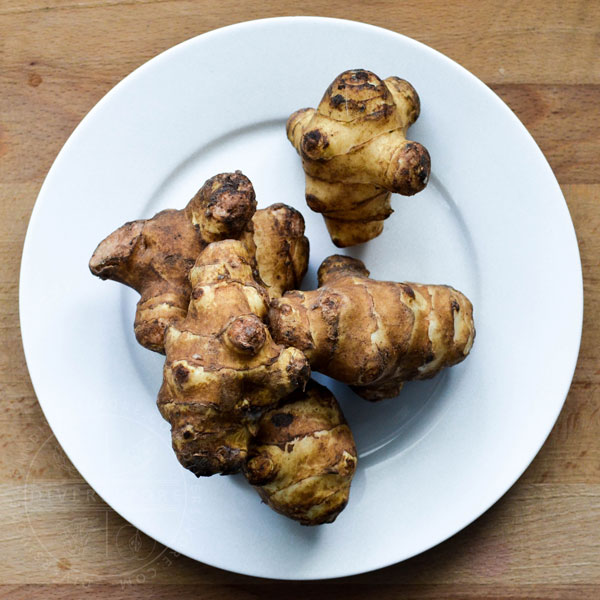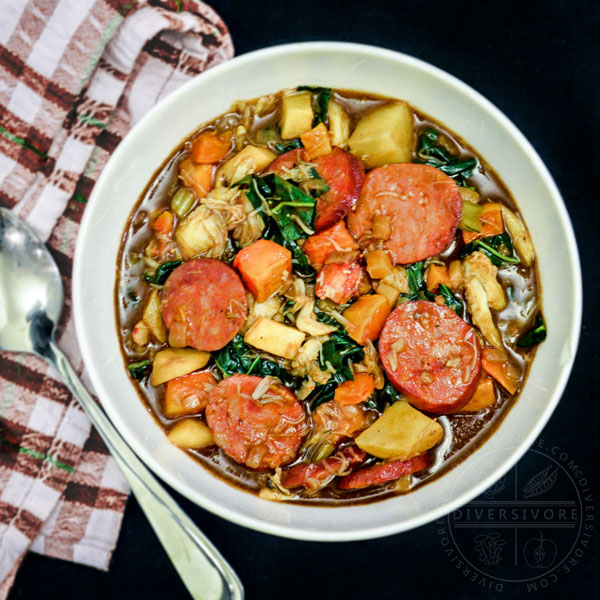How to Find, Choose, & Use
Jerusalem Artichokes
Helianthus tuberosus

Share this Guide
The Basics
What Is It?
A distinctive and underused tuber/root vegetable in the sunflower family (Asteraceae), native to North America.
Seasonality
FALL to EARLY SPRING
Flavour Profile
Starchy/sweet with a relatively crunchy texture
Other Names
English: Sunchoke, sunroot, earth apple
French: topinambour
Jerusalem Artichoke FAQs
Are Sunchokes the same as Jerusalem Artichokes?
Yes! Jerusalem artichoke is the older name - the name sunchoke was first used in the 1960s to try to improve marketability.
Do Jerusalem Artichokes cause gas?
It varies from person to person, but for many, yes. Jerusalem artichokes are high in a type of fiber called inulin. This starchy polysaccharide tastes sweet, but can't be broken down by our digestive system. This means that it becomes food for bacteria in the gut, who feast on it and produce waste gases. The longer Jerusalem artichokes are stored, the more of their inulin is converted into easily digested fructose, making them less gas-provoking. For more on this, read the Health & Science note found below.
Are Jerusalem Artichokes Low-Carb/Keto/FODMAP?
This is a bit of a complicated question. While they are a starchy root vegetable, Jerusalem artichokes are interesting because of their high levels of inulin (an indigestible polymer of fructose). Fresh out of the ground, they're fairly low in carbohydrates, moderately ketogenic (especially for a root vegetable), and fairly high-FODMAP. They're a very low glycemic index food, with a score of 11 (compare this to the GI score of ~70-80 for potato). But as soon as their harvested and stored, the tubers begin converting the inulin to easily-digested fructose. As such, the longer the roots are stored, the higher in DIGESTIBLE carbohydrates they become. If stored long enough, Jerusalem artichokes can actually end up with a carbohydrate closer to that of a sweet potato.
How-To
Find
Look for them at farmers’ markets and well-stocked greengrocers and grocery stores.
Choose
Look for smooth, unblemished tubers. They bruise easily, so don’t be put off by a few scuffs or dents, but do avoid obvious soft/dark areas and any fuzzy or badly wilted tubers.
Prep
Difficulty: Low to Medium - Jerusalem artichokes can be washed to remove any clinging dirt and used as-is. If you peel them (which many recipes call for) they can be a bit more work because of their irregular knobby shape. Chopped Jerusalem artichokes will begin to brown when exposed to air, so you may wish to toss them with a little lemon juice or vinegar.
Use
Frequently cooked and used like potatoes (e.g. in recipes, as a side, mashed, pureed, etc.). Jerusalem artichokes are also eaten raw in salads, etc. The skin is edible and relatively thin.
Store
Long term: Can be kept for several months in a cool, dark root cellar (or similar) in plastic bags, or in moist sand.
Short term: In a paper bag in the crisper drawer of the fridge for up to 10 days.
Jerusalem artichokes DO NOT freeze well.
Culinary Info
Flavour Profile
Nutty/Starchy/Sweet - As with many other tubers, Jerusalem artichokes have a starchy consistency with a slightly nutty taste. They are also quite sweet for a vegetable thanks to the indigestible carbohydrate/fiber inulin.
Substitutions
From a purely culinary perspective (i.e. ignoring nutritional aspects), potatoes and well-cooked water chestnutsmake a decent substitute for the cooked tubers. Raw Jerusalem artichokes can be swapped out for raw (or lightly cooked) water chestnuts. Jicama and brazil nuts can make good, if unconventional, substitutes in some situations (see Substitutions note below for more).
Cuisines
Despite being important to First Nations North American peoples, Jerusalem artichokes have only recently become more popular in contemporary North American cuisine. They do have a longer history of use in France. Purees and mashes are particularly popular, but they’re surprisingly versatile and can be used in salads, baked dishes, soups, and much more.
Flavour Pairings
Raw: Nuts, salad greens, crisp fruits
Cooked: cheese, tomatoes and tomato sauce, roasted meats, milder savoury herbs.Varieties
Sunchoke is the most common commercially grown and marketed variety, but there are numerous others varying in shape and colour (see Important Varieties note below for a list).
More Info
Nutrition
Very low in carbohydrates(especially for a root vegetable), and moderately high in iron.Nutrition FactsJerusalem Artichoke - 100 g (3.5 oz)Amount Per ServingCalories 73 Calories from Fat 9% Daily Value*Fat 1g2%Sodium 4mg0%Potassium 429mg12%Carbohydrates 17g6%Fiber 2g8%Sugar 10g11%Protein 2g4%Vitamin C 4mg5%Calcium 14mg1%Iron 3mg17%* Percent Daily Values are based on a 2000 calorie diet.Top-To-Tail
The tubers of the plant are eaten, including the skin (if desired). No other part of the plant is commonly consumed.
GMO Status
Non-GMO
Health & Science
- Jerusalem artichokes are exceptionally high in inulin, which is an indigestible polymer of fructose responsible for their sweet flavour. Inulin is an important dietary fiber, and particularly important in diabetic diets - but do note that stored Jerusalem artichokes become higher in fructose over time!
- Inulin can’t be digested by humans, bacteria in the gut can go to town on it. These bacteria produce waste gases, meaning that a diet high in Jerusalem artichokes can lead to excess gas and (for some) intestinal discomfort.
- See Health & Science notes below for a more detailed explanation.Organic vs. Conventional
Jerusalem artichokes are popular amongst small-scale organic farmers, especially thanks to their prolific growth-habit. Conventionally grown tubers are also fairly common. Because the plants are so hardy and resistant to pests, you can generally assume that very few pesticides have been used regardless of organic/conventional status.
Share this Guide


